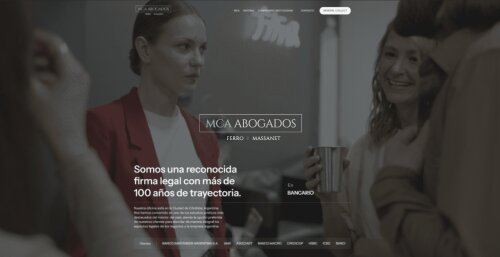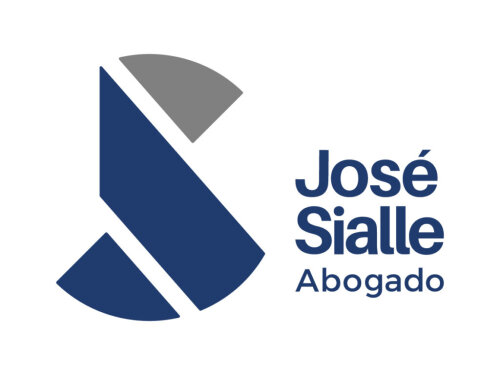Best Business Registration Lawyers in Córdoba
Share your needs with us, get contacted by law firms.
Free. Takes 2 min.
List of the best lawyers in Córdoba, Argentina
About Business Registration Law in Córdoba, Argentina
Business registration in Córdoba combines federal corporate rules with provincial and municipal registration requirements. At the federal level, commercial entities are governed by national corporate law and tax law, which set out types of companies, minimum formalities for incorporation, tax categories, and employer obligations. At the provincial level the Inspección General de Personas Jurídicas de la Provincia de Córdoba administers registration, filings and records for many legal entities in the province. Municipal governments regulate local commercial habilitation, zoning and municipal taxes. In practice this means an entrepreneur must satisfy a mix of federal, provincial and municipal formalities to start operating legally in Córdoba.
Common corporate forms used in Córdoba include Sociedad Anónima - SA, Sociedad de Responsabilidad Limitada - SRL, Sociedad por Acciones Simplificada - SAS, unipersonal companies and unregistered options for small taxpayers such as Monotributo. Each form has different formalities, liability regimes, capital requirements and governance needs. Taxes and employer obligations require parallel registration before federal and provincial authorities. Understanding the interplay of these rules helps avoid delays, fines and operational risks.
Why You May Need a Lawyer
Registering a business often seems straightforward, but legal advice is useful in many situations:
- Choosing the right legal form. A lawyer explains liability exposure, governance requirements, tax consequences and the ability to bring in partners or investors.
- Drafting constitutive documents. Articles of incorporation, bylaws and shareholder agreements set long-term rights and obligations. Poor drafting creates disputes later.
- Foreign investment or foreign directors. Lawyers help satisfy identification, residency and foreign exchange reporting rules.
- Regulatory, licensing or zoning issues. Complex activities such as manufacturing, food services, healthcare and real estate development require compliance with provincial and municipal rules.
- Structuring shareholder relations and exit mechanisms. Founders benefit from provisions that anticipate transfer of shares, buyouts and dispute resolution.
- Mergers, conversions, inbound investment or liquidation. These operations trigger specific formalities and tax consequences that benefit from legal planning.
- Resolving disputes with partners, creditors or government agencies. Lawyers represent clients in administrative proceedings and court.
Local Laws Overview
Key aspects of local regulation in Córdoba that affect business registration include:
- Provincial registry and oversight - Inspección General de Personas Jurídicas de la Provincia de Córdoba. This office receives applications, inscribes constitutive acts and corporate modifications, and maintains public records for many entity types established in the province.
- Provincial taxation - Dirección General de Rentas de la Provincia de Córdoba administers provincial taxes and rates such as gross receipts tax when applicable. Many businesses will need provincial tax registration in addition to federal registration.
- Municipal habilitation and commerce permits - Municipalities set rules on commercial habilitation, signage, local permits, waste and safety inspections. The Municipalidad de Córdoba is the primary municipal body for the city of Córdoba.
- Federal obligations - AFIP administers tax identification numbers - CUIT - VAT and employer contributions. Federal labor law - Ley de Contrato de Trabajo - and social security rules are enforced nationally via ANSES and related agencies.
- Corporate law framework - National corporate law defines the main company types, required corporate acts, capital rules and disclosure obligations. Recent reforms introduced simplified entities - SAS - to facilitate faster and more digital incorporations, although provincial steps may still apply.
Frequently Asked Questions
What steps do I need to take to register a company in Córdoba?
Generally the steps are - choose the legal form, check and reserve the company name, draft the constitutive instrument - articles of incorporation or contract - have it signed and notarized if required, submit to the provincial registry for inscription, obtain CUIT at AFIP, register for provincial and municipal taxes and obtain local commercial habilitation before starting operations. Specific steps and documentation depend on the company type.
How long does registration typically take?
Timing varies. For a SAS or small entities that use digital platforms the process may be completed in a few days to a couple of weeks. For SA or SRL that require notarization and provincial registry review the process can take several weeks to a few months depending on workload, the need for corrections and local approvals.
How much does it cost to register a business?
Costs depend on entity type, notary fees, registry fees, legal and accounting fees and any capital deposit requirements. A simple sole proprietorship or monotributo registration is low cost. SA and SRL involve higher notary and registry costs. Budget for professional fees and variable government charges. Exact amounts change with updates to fee schedules.
Do I need a notary or can everything be done online?
Some modern entity types - notably SAS - have online incorporation options, but other company types require a public deed signed before a notary public. The provincial registry may allow electronic filings for certain acts, but not all procedures are fully digital in Córdoba. Check the requirements for the specific entity form you select.
Can a foreign national or foreign company form a business in Córdoba?
Yes. Foreign natural persons and foreign legal entities generally can participate in Argentine companies. They will need to satisfy identification and documentation requirements, obtain tax identification - CUIT - and comply with foreign investment and foreign exchange rules. Legal and tax advice is highly recommended to navigate residency, corporate and tax implications.
What is the difference between Monotributo, Responsable Inscripto and other tax categories?
Monotributo is a simplified tax regime for small taxpayers that combines tax and social contributions into a single monthly payment and is suitable for micro businesses under thresholds for revenue and other limits. Responsable Inscripto is a standard VAT taxpayer who invoices with VAT and files separate social security and income tax obligations. The right category depends on annual turnover, activity type and expected expenses.
What documents are usually required to register a company?
Common documents include valid ID for founders, proof of address, the constitutive document and bylaws or articles of incorporation, powers of attorney when applicable, bank proof of capital deposit if required, tax forms for AFIP registration and any municipal or provincial forms. Exact documentation depends on the entity type and specific registry requirements.
Can I change my company type later if my business grows?
Yes. It is possible to convert one company form into another - for example SRL to SA - subject to legal procedures, shareholder approval and registry filings. Conversions may have tax and corporate governance consequences. Planning the change with a lawyer and accountant reduces unexpected costs and delays.
What are the penalties for operating without proper registration or permits?
Penalties can include fines, closure orders from municipal authorities, denial of tax benefits, back taxes and contributions, and civil or administrative sanctions. Operating without proper registrations also exposes owners to personal liability in some cases. Compliance prevents these risks.
How do I hire employees once the company is registered?
Employers must register with AFIP and ANSES for social security and payroll withholding, set up worker registration, pay employer contributions, enroll in an occupational risk insurer - ART - and comply with labor contracts under Ley de Contrato de Trabajo. Tax withholding rules and reporting are handled through AFIP platforms; employment contracts and internal records must meet legal requirements. Consulting a laboral lawyer or an accountant is advisable to set up payroll correctly.
Additional Resources
Helpful local and national institutions and professional bodies include:
- Inspección General de Personas Jurídicas de la Provincia de Córdoba - provincial registry and corporate oversight.
- Administración Federal de Ingresos Públicos - AFIP - federal tax identification and tax administration.
- Dirección General de Rentas de la Provincia de Córdoba - provincial tax authority.
- Municipalidad de Córdoba - municipal habilitation, permits and local taxes.
- Colegio de Escribanos de Córdoba - for notary guidance and locating notaries.
- Colegio de Abogados de Córdoba - for referrals to lawyers with corporate and administrative experience.
- Colegio de Graduados en Ciencias Económicas - for accountants who handle tax registration and payroll setup.
- Cámara de Comercio de Córdoba and sectoral chambers - for business guidance and networking.
Next Steps
If you need legal assistance to register a business in Córdoba follow this practical roadmap:
- Gather basic information - define the business activity, estimate annual revenue, list potential partners and capital contributions.
- Consult an experienced local lawyer and an accountant - ask about prior experience with Córdoba registrations and request a written fee estimate and timeline.
- Reserve the company name and prepare the constitutive documents - lawyer drafts or reviews bylaws, shareholder agreements and power of attorney documents.
- Complete necessary notarizations and submit the file to the provincial registry - monitor the registry process and respond promptly to any requests for clarification.
- Register with AFIP for CUIT and tax categories, register with provincial tax authority and secure municipal habilitation before opening premises.
- Set up payroll and social security registrations if hiring employees - register with ANSES and select ART coverage.
- Maintain records and compliance - keep corporate minutes, file annual reports and tax returns on time to avoid penalties.
Tips when hiring counsel - confirm the lawyer is licensed in Córdoba, request references or examples of similar registrations, get a clear scope of work and a written engagement letter, and coordinate lawyer and accountant work to avoid duplicate steps. Early legal and tax planning saves time and reduces startup costs.
Lawzana helps you find the best lawyers and law firms in Córdoba through a curated and pre-screened list of qualified legal professionals. Our platform offers rankings and detailed profiles of attorneys and law firms, allowing you to compare based on practice areas, including Business Registration, experience, and client feedback.
Each profile includes a description of the firm's areas of practice, client reviews, team members and partners, year of establishment, spoken languages, office locations, contact information, social media presence, and any published articles or resources. Most firms on our platform speak English and are experienced in both local and international legal matters.
Get a quote from top-rated law firms in Córdoba, Argentina — quickly, securely, and without unnecessary hassle.
Disclaimer:
The information provided on this page is for general informational purposes only and does not constitute legal advice. While we strive to ensure the accuracy and relevance of the content, legal information may change over time, and interpretations of the law can vary. You should always consult with a qualified legal professional for advice specific to your situation.
We disclaim all liability for actions taken or not taken based on the content of this page. If you believe any information is incorrect or outdated, please contact us, and we will review and update it where appropriate.













